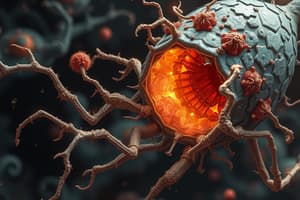Podcast
Questions and Answers
What is the primary trigger for the intrinsic pathway of apoptosis?
What is the primary trigger for the intrinsic pathway of apoptosis?
- Inflammation and oxidative stress
- Most commonly irreparable DNA damage (correct)
- Cells that are a danger, such as tumour cells or virus-infected cells
- Hormonal imbalance
What is the primary characteristic of apoptosis?
What is the primary characteristic of apoptosis?
- It results in the destruction of multiple cells
- It is a passive process that occurs due to cellular damage
- It is an energy-dependent active process (correct)
- Lysosomal enzymes are involved in the process
What happens to the nuclear DNA during apoptosis?
What happens to the nuclear DNA during apoptosis?
- It is protected from degradation
- It is translocated to the cytoplasm
- It is degraded by enzymes (correct)
- It is replicated to increase the DNA content
What is the role of the p53 protein in the intrinsic pathway of apoptosis?
What is the role of the p53 protein in the intrinsic pathway of apoptosis?
What is the final step in the clearance of apoptotic bodies?
What is the final step in the clearance of apoptotic bodies?
What is the primary function of apoptosis during embryogenesis?
What is the primary function of apoptosis during embryogenesis?
Which of the following is an example of physiological apoptosis?
Which of the following is an example of physiological apoptosis?
What is the difference between oncosis/necrosis and apoptosis?
What is the difference between oncosis/necrosis and apoptosis?
What is the role of caspases in apoptosis?
What is the role of caspases in apoptosis?
What is the role of TNFalpha in the extrinsic pathway of apoptosis?
What is the role of TNFalpha in the extrinsic pathway of apoptosis?
What is the result of cytochrome C release from the mitochondria in the intrinsic pathway of apoptosis?
What is the result of cytochrome C release from the mitochondria in the intrinsic pathway of apoptosis?
What is the characteristic of apoptosis in terms of the number of cells affected?
What is the characteristic of apoptosis in terms of the number of cells affected?
What is the initiating signal for the intrinsic pathway of apoptosis?
What is the initiating signal for the intrinsic pathway of apoptosis?
What is the characteristic of the membrane during apoptosis?
What is the characteristic of the membrane during apoptosis?
Flashcards are hidden until you start studying
Study Notes
Apoptosis: Programmed Cell Death
- Apoptosis is a programmed cell death, an active process that requires energy
- Characterized by shrinkage, induced by a regulated intracellular program
- Enzymes are activated to degrade nuclear DNA and proteins, maintaining membrane integrity
- Affects a single cell or group of cells, with a characteristic microscopic appearance
- Lysosomal enzymes are not involved, and the process is quick, taking only a few hours
Physiological Apoptosis
- Occurs to maintain a steady state
- During hormone-controlled involution, such as in breast gland epithelium after lactation
- During embryogenesis, for removal of tissue and organ sculpting
Pathological Apoptosis
- Occurs in cytotoxic T cell killing of virus-infected cells
- Removal of neoplastic cells
- In response to cell damage, particularly with damaged DNA
- In graft vs host disease
Initiation and Execution of Apoptosis
- Triggered by two mechanisms: intrinsic and extrinsic pathways
- Both pathways result in activation of caspases, enzymes that control and mediate apoptosis
- Caspases cause cleavage of DNA and proteins of the cytoskeleton
Intrinsic Pathway
- Initiated by signals from within the cell
- Triggers include irreparable DNA damage and withdrawal of growth factors or hormones
- p53 protein is inactivated, leading to leaky outer mitochondrial membrane
- Cytochrome C is released, causing activation of caspases
Extrinsic Pathway
- Initiated by extracellular signals
- Triggers include cells that are a danger, such as tumor cells or virus-infected cells
- One of the signals is TNFalpha, secreted by T killer cells
- TNFalpha binds to cell membrane receptor, resulting in activation of caspases
Clearance of Apoptotic Bodies
- Both intrinsic and extrinsic pathways cause cells to shrink and break up into apoptotic bodies
- Apoptotic bodies express proteins on their surface, allowing recognition by phagocytes or neighboring cells
- Finally, degradation takes place within the phagocytes
Apoptotic vs Necrotic Cells
- Apoptotic cells: programmed cell death, shrinkage, and maintenance of membrane integrity
- Necrotic cells: unprogrammed cell death, cell swelling, and loss of membrane integrity
Studying That Suits You
Use AI to generate personalized quizzes and flashcards to suit your learning preferences.


